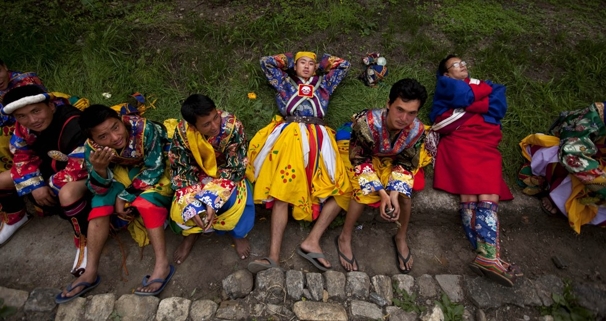Thursday, April 25, 2013
Bhutan
Population: 738,362
Capital: Thimphu
Currency: Bhutanese Ngultrum and Indian Rupee
Language: Dzongkha phrases: hello (Kuzu Zangpo) goodbye (Shu lay log jay ge)
Climate: The climate varies based on where one is in the country. It is effected by monsoons which make the majority of the country subtropical. There is snow year round in the higher altitudes.
Religion: About two thirds of the population practice Durkpa Kagyupa or Ningmapa Buddhism which are forms of Mahayana Buddhism. One quarter of the population are Nepalese and they practice Hinduism. Christians, Catholics and other religious groups make up less than 1% of the population.
Sports: Archery is the national sport, but soccer is the most popular sport. Cricket has gained popularity since Indian television stations were introduced. Bhutan and Montserrat played "the other final" on the same day the final for the World Cup was played in 2002. Bhutan and Montserrat were the two lowest ranked teams in the world. Bhutan won 4-0.
Flag:
Famous people: There are no famous people known from Bhutan.
Facts:
* Its about half the size of the state of Indiana
* Bhutan means "land of the thunder dragon" it got that nickname because of the storms that come from the Himalayas
* The only nation in the world where the sale of tobacco is prohibited
* One of two countries whose capitals do not have a single traffic light
* The internet and TV were banned in the country until 11 years ago
* When offered food you must refuse it, you can give in after a second or third offer
Culture: Most of the towns are accessible only by foot. Religion plays a large part in the culture of Bhutan, temples and religious structures fill the villages. Prayer flags are seen flapping in the wind and most homes have a Chosum which is a small room set aside for prayer. The national government has made it a law that Bhutanese must wear traditional clothes in public. That consists of a gho (knee length robe tied at the waste) and women wear a kira (ankle length dress worn with a jacket).
Activity
One day at work I started talking with my friend Ram and he told me his amazing story.
Ram is Nepalese but his family lived in Bhutan. Several Nepalese families lived in Bhutan for generations and helped establish the country, but kept their Nepalese culture and language. When Bhutan became an independent country they decided not to accept the religion, culture or language of the communities from Nepal and said they had to give up their culture or leave the country. His family was in danger of being killed because they would not give up their heritage. One night his father escaped and told his wife to come join him. His wife was not sure where her husband went, but with her four children she fled in the middle of the night to try and find him. They walked over mountains, through rivers and all sorts of conditions, but made it safely to Nepal where her husband was waiting.
Upon arriving in Nepal their family soon discovered that Nepal had been inundated with these refugees and had no place for them. His family was moved to a refugee camp where they had to stay until someone decided what to do with them. For 20 years Ram lived there, he grew up there, went to school there and ended up teaching school there. He said that once a year a large pile of clothes would arrive and each member of the family was able to reach in the pile and grab something out. It didn't matter what it was, they had to except it, even if it was too small or too large. Because Ram had a big family they all shared what they received and that was their only new clothes for the whole year. They lived off of wheat and meat and little else. Finally one day the United Nations came and helped to send them to the United States. Now Ram is working to pay back the United Nations and also support his family.
It is hard to believe that in the 21st century there are still populations that live this way. I have traveled the world, moved around and had the freedom to go anywhere I wanted, I cannot imagine living in a tiny area, not being able to leave, and not knowing if my situation would ever change. It is experiences like these that encourage me to keep learning about these people and situations and how I can help. By becoming educated about cultures it opens my eyes to what is happening in the world, and while it might be easier to shut it out, it will still happen. Maybe by knowing and sharing these stories more people will become aware and help.
Subscribe to:
Post Comments (Atom)








No comments:
Post a Comment